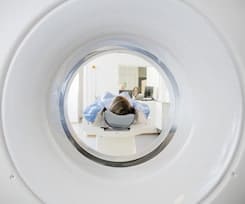A CT or CAT scan is used by doctors to visualize the inside of a patient’s body. CT stands for computed tomography, which means that a computerized composite of cross-sectional images is utilized to create a dimensional photo of the individual’s body. Most local imaging centers perform these diagnostic tests on a daily basis.
A CT scan can be conducted on any part of the body but is very commonly used to survey the chest and abdominal cavity. It gives an accurate and workable picture of the body’s vital organs and other various soft tissues, as opposed to its x-ray counterpart, which just shows the skeletal system.
For these reasons, the CT scan is your doctor or surgeon’s best tool to used when confirming a diagnosis or determining the progression of an illness or condition.
Here’s everything you need to know about a CT scan.
How Does a CT Scan Work?
A CT scan is performed by a radiologist at the request of a doctor or surgeon. The patient lays reclined inside the machine as the computer takes pictures. The CT scanner moves over the affected area and captures cross-section photos using x-ray technology.
What is produced is a series of images similar to what you would see if you sliced into the trunk of a tree and surveyed the flat stump left behind. With the use of these images and the computer that helps produce them, a physician is able to determine the extent of a patient’s injuries or the severity of the condition.
What Will My CT Scan Experience Be Like?
CT scans are exceptional diagnostic tools because they are minimally invasive, quick and painless. A patient will generally be finished with the entire process of their CT scan in less than 90 minutes. The radiologist will confirm details of the patient’s medical history, to ensure proper administration of the scan.
The individual will lay on a table that will move in through the round opening of the machine, but the patient will not be entirely confined or in the dark. Then, the scan will be performed, during which the patient will be instructed to remain still. The patient will also at times be asked to hold their breath so that certain images can be obtained.
After the scan has been completed, the radiologist will review the images, making certain that all of the necessary images are of the appropriate quality. They will then interpret the images and share them with the referring physician. The doctor will then share the findings that have been determined with the patient and proceed with their treatment plan.
What to Expect After Your Scan
CT scans are safe and expedient with today’s modern technology, so there isn’t a lot that is required of the patient in the way of preparation or post-scan care. The notable exception will be the patients who require what is called a scan “with contrast.”
This simply means that the doctor who is ordering the test would like to see the images with a dye injected, to provide a clearer delineation between various tissues. The dye is either ingested orally, in the case of an abdominal CT scan, or injected intravenously to the affected area.
When this type of CT scan is ordered, the patient will need to flush the dye out of their system following the exam. A CT scan doesn’t create any parameters in which you should restrict your normal activities.
Special Circumstances Surrounding CT Scans
Most CT scans are relatively straightforward and follow a similar pattern, but there are cases when the procedure is altered to accommodate different circumstances of individual patients.
Pediatric patients receive the same type of CT scans as adult patients, but they do oftentimes have more difficulty remaining still and calm during the scan. When the child is unable to relax enough for proper images to be captured, the parent or caregiver of the child will be permitted to enter the room with them and console them through the process.
Another instance in which CT scans differ slightly in procedure would be when the parameters of the scan are such that the patient needs to be sedated to undergo it. Some requests from doctors need an entirely motionless patient in order to see clearly what needs to be evaluated. These types of CT scans will need to be performed at a nearby hospital to allow for sedation.
If you or your loved ones require imaging to evaluate an injury or condition you are treating, trust the Atlanta imaging center at AICA Orthopedics to perform your diagnostic testing with excellence and efficiency. Our team of doctors and radiologists work hard to correctly diagnose issues the first time and treat them with the utmost care using images from CT scans each and every day.





